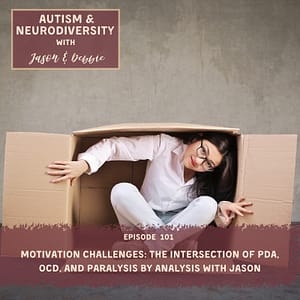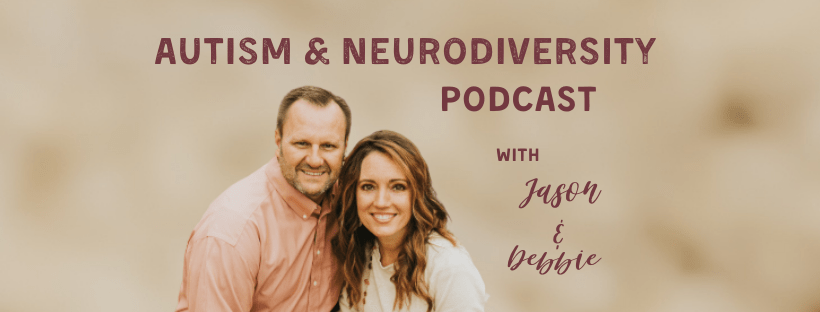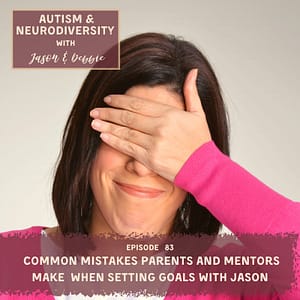[00:03] Jason: Welcome to the Autism and Neurodiversity podcast.
[00:06] Debbie: We’re here to bring you helpful information from leading experts and give you effective tools and support. I’m Jason Grygla, a licensed counselor and founder of Techie for Life, a specialized mentoring program for neurodiverse young adults.
[00:19] Jason: And I’m Debbie Grygla, a certified life coach. And maybe most importantly, we’re also parents to our own atypical Young Adults.
[00:30]
Hello? This is Jason Grygla.I’m coming to you on this podcast for autism and neurodiversity and I’m going to talk to you today about the top mistakes we make in setting goals as mentors for anyone who is neurodivergent. And that includes parents, teachers, therapists, mentors of all kinds. And so I’m just going to go through a list of the most common ones that I see.
We’ve probably talked about all of these in one way or another, but right here you’re going to have a specific list of the most common mistakes parents and others who are trying to help make when setting goals in the situation that they’re living in, trying to be a mentor. So let’s start with the most obvious ones.
The first mistake that we tend to make, our timeline specific goals. Timelines are nothing more than averages. They’re typical averages, meaning people that have normed expectations for when to date, drive, have good hygiene, will be able to get up on their own in the morning, those are all thrown out. And our goals would be better served talking about what’s the next step? And not necessarily, and for sure, not actually age specific, but then what’s next?
Instead of age specific not, they’re 16, they need to be doing this. Here’s where they’re at. Let’s set a goal for the next thing. Which brings me to the second mistake that we make in setting goals. We often make goals for them when they want them, even that they want to make the goal that are developmentally impossible based on where they’re at.
So we know that the brain develops neuron upon neuron and brain pathway by brain pathway and nobody gets to skip to skip steps in that development. So setting developmentally impossible timelines, which is typically about age, it’s almost the same thing.
Another really poor goal that we often make is when we set goals that are outcome expected. How to be is way more effective than what to do. Sometimes we need to set goals on what to do daily, hourly, weekly, monthly, so that we can become who we want to become.
And yet, if we set our goals with the expectation of a specific outcome, the more neurodivergent and or disabled that somebody is and they’re not always related, I get that. But the more difficulty someone has in developmental issues, the less likely they’re going to have outcome success.
And if our feel good is based on outcome, we’re in trouble. So it would be much better to have our goals based on our attitude, how we are, how much we try, how much effort we put into it, and then where the outcome falls is always going to be more effective than if we don’t make it to that line of accomplishment than we have failed.
And so that brings me to the next goal, which is that goals are pass / fail. Pass fail is so black and white and rigid that it’s almost exactly how someone who has a neuro divergent brain thinks, which is usually one of their weaknesses, that it has to be pass fail. I either did it or I didn’t. I’m either 100% or I failed completely.
So another inappropriate and effective goal would be things that we really should understand are developmentally impossible to accomplish. Meaning we don’t understand our mentee. We haven’t learned enough about their disability or their diagnoses or their developmental differences, their strengths and their weaknesses.
And that’s all diagnoses is for anyway, is to understand that if you can put somebody into a grouping of symptoms, then we know way more about what works and what doesn’t work to help them. So I don’t have a problem with diagnoses. I do have a problem with trying to mentor someone when we don’t understand why their brain works, the way it works, how it works, the way it works, and what that means for the individual.
So setting the impossible functioning needs like this week my child is going to stop wetting the bed. Okay. All right. Well, that’s a silly goal because it’s ineffective. We would want to set up what can we do about it? And in that specific situation, there are some things you can do. Oftentimes we almost have to ignore it completely for it to go away.
So that might be our goal, is how to change my attitude about the fact that my child still wants to be another inappropriate ineffective way we set goals is we set goals to meet our needs. I need my child to date because they’re lonely. Well, they might need to date too.
But if they’re not there developmentally and it’s an impossible expectation, then we don’t want to set that as the goal. And they might just be lonely until they figure it out. And that is hard to watch if it’s to meet my needs that they have better hygiene, some balance there. I agree. If they stink and you don’t want to be around them, I think it’s okay to have boundaries and say I don’t want you to be here if you stink.
So if you want to do whatever it is and try to find something that they want to do, then I need you to be clean so that I want to be around you. I love you and I miss you and I’m not around you and I can’t enjoy you when body odor is so bad. But if it is, I need them to be cleaner because it’s important to me and they don’t value it. That’s unsustainable. It really needs to be a goal about them and the things that they value.
Another goal would be another inappropriate way to set a goal would be anything that we are forcing. If we’re forcing it on them and pounding that square peg into a round hole we hurt them and ultimately it hurts us because it destroys our relationship with them and our ability to connect with them.
And I’ve said it before any parent that’s going to throw away their relationship and be the bad guy because they have to do what their child needs but their child grows up resenting them completely and you haven’t done it right. You haven’t had enough positives or wins or threaded that needle well enough to feel good about it. And then all of your exhausting time, energy and resources will have been rationalized that that was the best you could do. And in the end, you’re not happy. And your child is miserable and resentful as well. And the outcomes aren’t as good either.
Another way we set goals inappropriately is if we want our child to be happy at all cost. Being happy is a fine goal but it’s a sophisticated and murky place to tread because if all we want is for them to be happy we will be very comfortable with them being comfortable because we all connect being comfortable with being happy.
So I think changing it from immediate happy to fulfilling satisfaction happy and you can understand the difference between joy that comes from attachment versus what feels good in the moment. Yeah great. The goal itself to be happy, that’s crazy. Number one you can’t make them happy. Two if you try to make them happy it just makes it worse. So it’s a crappy goal.
Another mistake we make when setting goals is when we give them what they want not what they need. Parents’ job is to give them what they need, not what they want. And there’s a balance obviously if I’m going to get them a Christmas gift I hope I get them something that they want and I might get them something that they want even though they wouldn’t have asked for it. Because I want them to stretch in a direction that I think would be good for them and that they won’t resent me for trying to fix them or control them. So there’s that balance.
Another mistake that we make setting goals is that we make goals for them and leave it completely up to them to accomplish well. They need to have the ownership they need to accomplish it for themselves. I can’t be a part of the equation agreed and not. And that’s why we have mentees, that’s why we are mentors. That’s why we have parents and teachers and coaches and people invested in us relationally for our long term benefit.
And so if we help them set goals and then leave them to fend for themselves especially if it’s things that are destructive. It’s not a healthy goal. An example of that would be if we give them full, complete control over their finances when they’re not ready and they really aren’t capable of managing their money so that they have enough food. Now we’re going to be angry at them when they ask for money for food. And we’ll be hurting because they’re hungry and we don’t want our children to be hungry. And it just causes more contention and destruction.
So another mistake that we make in goal setting is when we set goals that actually hurt us. Meaning if we set goals for them that are going to drain us, take away from our relationships with ourselves and with our marriage partner or our other life relationships. And the goal for this loved one, this mentee, this neuro, divergent person, if that goal overwhelms other priorities in her life because it was unrealistic or we meant well, but we didn’t really understand it and we don’t reassess and we stay rigidly stuck on something that’s actually harmful, that’s not helpful.
It reminds me of parenting when we ground a child in a way that makes us miserable for the whole weekend because our child has the ability to destroy our weekend when they’re the one that messed up and yet the consequence punishes us, that’s not helpful. And that’s not helpful with goals either. So setting goals that destroy us or drain our lifeblood, then it’s just too much and we need to tone it back. Another one. And may well, this is another one. A goal where Mcminnti doesn’t have buy in or ownership. If they don’t have ownership, then you’ve tainted it. And sometimes when we bring up a goal, just the fact that we’re the ones that brought it up means they can’t have that as a goal because they want to make their own decisions.
And I’ll tell you, I don’t make New Year’s resolutions or goals anymore. I don’t. Because I resent myself and I feel like a failure if I don’t accomplish them. I know what I want. I know who I want to be. I don’t need to set goals for myself because I have too many mental issues, intellectual issues about feeling like I have to do something.
And as soon as I put it on paper because I want to do something, after a few weeks, if the paper is telling me and reminding me what to do, it almost distracts me from what I want. And I get focused on somebody or something outside of me, like the goal to tell me what to do. And I know that’s shallow and simple and I’m 50 and I’m a therapist, but it still bothers me. So I don’t like to write goals down for me, they don’t work.
Other people, they love them, they get it. That’s great. I don’t have a problem with that. But we all have goals inside about things that we’re wanting. So this was a list of the most common mistakes we make when setting goals and how they will end up ineffective, unsustainable, unhappy, hurting our relationships, and frustration.
I want you to avoid all of those things. And I think Debbie will probably be talking to you about how to set goals that are effective, sustainable and healthy and some of the guidelines surrounding that approach. So I hope this doesn’t discourage you from having goals and wanting growth. I think it’s critical and important to want to push ourselves a little more and a little more and not stay comfortably stuck. So I hope you do have goals and want things to be better for you and your loved ones. So good luck with that and we will talk to you soon. Thanks for joining me.
[13:07] Debbie: Thanks for joining us on this episode of Autism and Neurodiversity with Jason and Debbie. If you want to learn more about our work, come visit us at jasondebbie.com.




